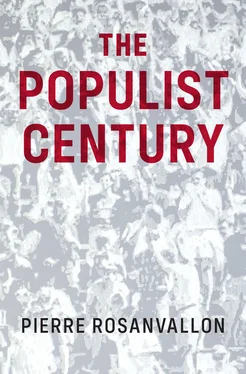10 10 Hence the minimal attention paid to unions by populist movements.
 2
2  A THEORY OF DEMOCRACY: DIRECT, POLARIZED, IMMEDIATE
A THEORY OF DEMOCRACY: DIRECT, POLARIZED, IMMEDIATE
Populisms function from within the perspective of an effort to regenerate democracy. From that standpoint, they undertake to prosecute existing democracies as these are generally practiced and theorized – let us call them liberal representative democracies. They are liberal in the sense that they have set up procedures and institutions to ensure against the risk of tyranny on the part of majorities; guarantees protecting the integrity and autonomy of individual persons occupy a central place. In most countries, this entails constitutional arrangements that guarantee individual rights, either by framing legislative power to that end or by establishing independent institutions designed to exert control over executive power or even to exercise some of its prerogatives. These democracies are representative in that they are based on the idea that the power of the people will be limited, with some exceptions, to the process of selecting and confirming leaders through elections. The populist vision of democracy seeks to offer an alternative that challenges both the liberal and the representative conceptions as diminutions of the democratic ideal.
Leaders such as Viktor Orbán and Vladimir Putin have thus repeatedly presented themselves as champions of a break with liberal democracy, implying that an open conflict between two competing conceptions of the democratic project exists today. Among theorists of democracy, we find Chantal Mouffe calling on her readers “to understand that liberal democracy results from the articulation of two logics which are incompatible in the last instance”; 1she invites us to stop identifying democracy with the rule of law and the defense of human rights – as neoliberalism does, in her view – and to restore the principle of collective sovereignty to the foreground. Hence the link between the aspiration to a populist radicalization of democracy and the intellectual stigmatization of a societal and “human-rights-ist” vision that is accused of privileging the cult of the individual and of minorities at the expense of the concern for affirming the sovereignty of the people. Hence, also, the positive theorization of the illiberal character of the populist project as the condition for a more authentic democracy (we shall return at length to this point in the concluding part of this book).
On this basis, the populist conception of democracy presents three characteristics. It seeks first of all to privilege direct democracy , calling in particular for the multiplication of referendums initiated by the people. Next, it defends the project of a polarized democracy , denouncing the non-democratic character of unelected authorities and of constitutional courts. Finally, it exalts – and this is the key point – the immediate and spontaneous expression of popular opinion.
The cult of referendums and the apologia for direct democracy
In France, it was in the mid-1980s, as the Front National was beginning to gain ground in the voting booths, that that right-wing party made the extension of referendum procedures one of its major campaign themes. Calling for a “true French revolution,” Jean-Marie Le Pen spoke of the need to “enlarge democracy” in this manner, in order to “restore speech to the people.” 2He described referendums as “the most perfect expression of democracy.” And he called at the same time for the introduction of a specific type of “veto-referendum” that would allow the people to “oppose the promulgation of laws adopted by the Parliament but of which the people disapproved.” 3A little later, the Front National program for the 1997 legislative elections became more precise, proposing to extend the use of referendums “to liberate the French people from the yoke of the political class”: a “popularly initiated referendum” was supposed to allow citizens to decide for themselves on issues submitted for their consideration. 4
The intellectual circles that accompanied the Front National’s rise in strength during that period, concentrated in institutions such as the Club de l’Horloge (an elite right-wing think tank promoting nationalism) or GRECE (a militant right-wing “group of research and study for European civilization”), were simultaneously pursuing this celebration of direct democracy by connecting it with the Swiss tradition, which they described as a model democracy rooted in history and careful not to allow itself to be denaturalized by foreign bodies. It was thanks to direct democracy, they argued, that Switzerland was able to protect itself from fiscal abuses and from massive immigration. 5Direct appeals to the public were thus presented as the way to get rid of the old elites – politicians and oligarchs – while guarding against the danger of invasion by “unassimilable” immigrants; the traditional representative system was relegated to a sort of prehistory of democracy. All later populist movements have adopted this vision of direct democracy, which they see as an effective instrument to be used by a healthy and fully sovereign people for sidelining corrupt and incompetent elites. Moreover, referendums present a powerful performative specificity, since by speaking out – seizing the floor – in this way the people are thought to be expressing a directly active will, thus breaking with all the temporizing on the part of the politicians.
The way the 2005 referendum on the European Constitution was sidestepped three years later by the French Parliament’s ratification of the Treaty of Lisbon made a deep impression in France. If one had to settle on the moment when the populist groundswell began to expand in the country, this would certainly be the symbolic date to choose. Ever since, populist figures have foregrounded the democratic character of referendums as opposed to the propensity of representative parliamentary systems to confiscate the sovereignty of the people. Eleven years after the French signed the Treaty of Lisbon, the affirmation of the popular preference for Brexit was similarly contrasted with the contrary aspirations of the majority of members of the British Parliament. And throughout Europe one could see, in populist milieus, a revival of interest in the Swiss procedures for popular initiatives and voting, thanks to which Christophe Blocher’s UDC (the Democratic Union of the Center, or Swiss People’s Party) was repeatedly able to dictate the agenda for the country’s debates. Indeed, populist regimes all over the world have been resorting to referendums in order to solidify their legitimacy and often to increase the prerogatives of the executive branch. In such cases, referendums frequently look very much like plebiscites. But this issue has scarcely been examined in populist circles, whether on the right or on the left, so firmly has the democratic perfection of the referendum procedure come to seem self-evident.
“Government by judges” is an expression that has often been used in France to stigmatize what has been perceived as a threat: the increasing authority of a judiciary that has become more and more independent in many democracies. Populists denounce this independence in particular when it is expressed through the development of jurisprudence that amplifies a law in the process of interpreting it. Marine Le Pen has hammered away at this point in a typical refrain: “Judges are there to apply the law, not to invent it, not to thwart the will of the people, not to replace legislators. A public office is not supposed to authorize its holder to usurp power.” 6Some have not even hesitated to use the newly coined term “juridictatorship” to characterize the independence of the magistracy and the extension of the authority of France’s Constitutional Council, 7qualifying the rule of law as “the central error” of contemporary democracies. The opposition between law and democracy is not a new one. It was the focus of many arguments during the American and French Revolutions, leading the writers of the French Constitution, in 1790, to adopt the principle of electing judges. (Called into question later on, this principle remained a republican demand throughout the nineteenth century.) For their part, many American states also instituted mechanisms for electing judges; these systems are still in place. 8But the law/democracy opposition has been radicalized in the populist vision, which deems that the magistracy can claim only a narrow functional legitimacy, and that the democratic status of this legitimacy is secondary to that of the elected officials who have been anointed by popular vote. In this case, we can speak of a polarized vision of legitimacy and of democratic institutions, in which voting is seen as the unique means of democratic expression. (This vision leads in turn to the view that democracy itself is a procedural matter, lacking any substantive dimension; the term might characterize, for example, the quality of an institution and its operations.)
Читать дальше

 2
2 










